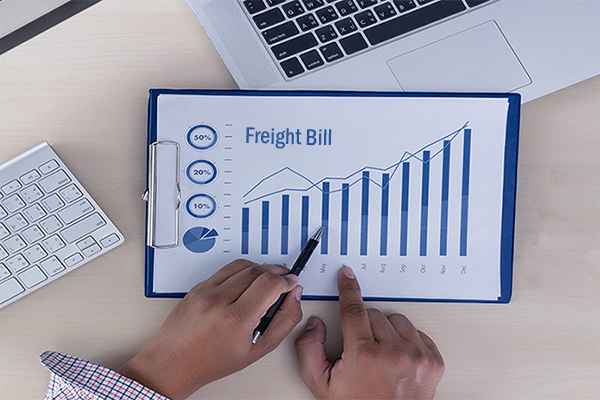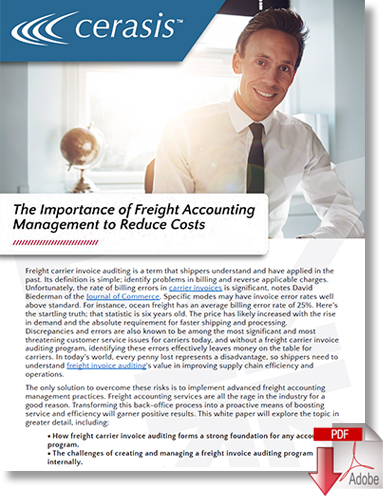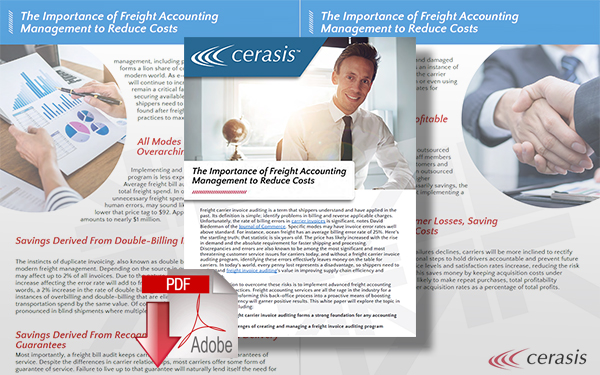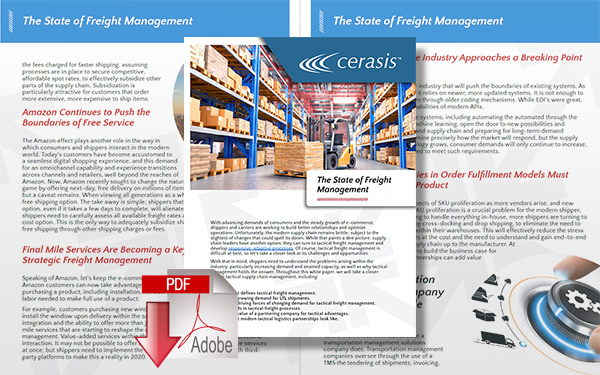Average Savings Found After a Freight Bill Audit

To stay competitive, shippers need to understand the average savings found after a freight bill audit and follow a few best practices to maximize recovery.
Savings Found After Freight Bill Audit
Shippers spend an average of 10% of gross expenses on transportation management.
Aside from labor costs, transportation management, including paying carriers and sending freight, forms a lion share of costs to run a business in the modern world.
As e-commerce grows, freight spend will continue to increase, and such increases will remain a critical factor in negotiating contracts and securing available capacity.
To stay competitive, shippers need to understand the average savings found after a freight bill audit and follow a few best practices to maximize recovery.
All Modes Freight Bill Audits and Overarching Savings
Implementing and maintaining a freight bill audit program is less expensive than many shippers realize.
Average freight bill audit programs recover up to 8% of total freight spend.
In other words, recovering $100 of additional freight spend, deriving from erroneous charges or human errors, may sound like a costly process.
Shippers could lower that price tag to $92. Applied across 10,000 shipments, it amounts to nearly $1 million.
Savings Derived From Double-Billing Instances
The instances of duplicate invoicing, also known as double billing, forms another major issue for modern freight management.
Depending on the source in question, the rate of double billing may affect up to 2% of all invoices.
Due to the nature of double billing, any percentage increase affecting the error rate will add to freight spend to the value increased.
In other words, a 2% increase in the rate of double billing increases total freight spend by 2%.
Meanwhile, instances of overbilling and double-billing that are eliminated effectively lower total transportation spend by the same value.
Of course, the risk of double-billing is more pronounced in blind shipments where multiple bills of lading exist, notes Inbound Logistics.
Savings Derived From Recognizing Failures to Meet Delivery Guarantees
Most importantly, a freight bill audit keeps carriers in compliance with their guarantees of service.
Despite the differences in carrier relationships, most carriers offer some form of guarantee of service.
Failure to live up to that guarantee will naturally lend itself the need for chargebacks.
These chargebacks are even more profound as shippers can become responsible for refunding funds for the product to customers, as well as customer-paid shipping charges.
The same principle applies to lost and damaged shipments too.
If a freight bill auditing function uncovers an instance of damage, the shipper can also hold the carrier liable, exercising additional caution or even using such information to secure better rates for future services.
Savings From More Profitable Staff in Your Facilities
Another arena of savings exists for outsourced freight accounting and bill audit practices.
Since staff members spend more time working with customers and encouraging sales, implementing an outsourced freight auditing program leads to higher profitability.
While this is not necessarily savings, the increased revenue compared to not implementing a program at all is considerable.
Reduced Risk of Customer Losses, Saving Money on Acquisition Costs
As the rate of losses and delivery failures declines, carriers will be more inclined to rectify any issues.
Carriers will take additional steps to hold drivers accountable and prevent future failures.
As a result, customer service levels and satisfaction rates increase, reducing the risk of angered customers.
In a sense, this saves money by keeping acquisition costs under control.
Since customers are more likely to make repeat purchases, total profitability increases, leading to lower customer acquisition rates as a percentage of total profits.
Increase Profitability by Implementing a Freight Bill Audit Program
As the global supply chain grows more complex, more shippers will face the uncertainty of shrinking profit margins and changing customer demands.
Instead of succumbing to higher costs deriving from inaccurate, erroneous freight billing and invoicing practices, shippers need to implement a freight bill audit program.
Of course, outsourcing the process of auditing freight invoices is the easiest and most lucrative opportunity to recapture unnecessary expenses.
Keep your organization’s freight spend under total control by recovering revenue with a comprehensive freight auditing program now.
Related Article: The State of the Tactical Freight Market and What You Need To Know To Understand It
Related White Papers
The Importance of Freight Accounting Management to Reduce Costs New!
This is a must-read for shippers who are looking to increase resolutions on invoice disputes and to work to mitigate instances of billing errors to reign in unnecessary freight costs. Download Now!
The State of Freight Management
This exclusive and educational resource “The State of Freight Management” white paper is a must-read for freight shippers who are looking to improve freight operations. Download Now!
More Cerasis Resources
Article Topics
Cerasis News & Resources
GlobalTranz Appoints Executive Chairman Bob Farrell as Chief Executive Officer Amazon’s Drone Delivery Hits Milestone with Federal Aviation Administration Clearance Digital Supply Chain: The Landscape, Trends, Types, and the Application in Supply Chain Management Walmart’s Bid for TikTok Could Benefit the Retail Giant’s Ecommerce and Advertising Businesses The State of Ecommerce Logistics Heading into 2020 Peak Delivery Season Bringing Omnichannel to the Forefront of Ecommerce FedEx’s Fred Smith Optimistic About Economic Recovery as Ecommerce Business Booms More CerasisLatest in Transportation
Trucking Industry Pushes Back on Government’s Electric Mandates Maersk Sees Silver Lining in Red Sea Shipping Challenges Baltimore Opens 45-Foot Deep Channel Following Bridge Collapse El Paso Border Delays Cost Juarez $32 Million Per Day in Economic Losses Ranking the World’s 10 Biggest Supply Chains The Top 10 Risks Facing Supply Chain Professionals Walmart’s Latest Service: Ultra Late-Night Delivery More Transportation

















